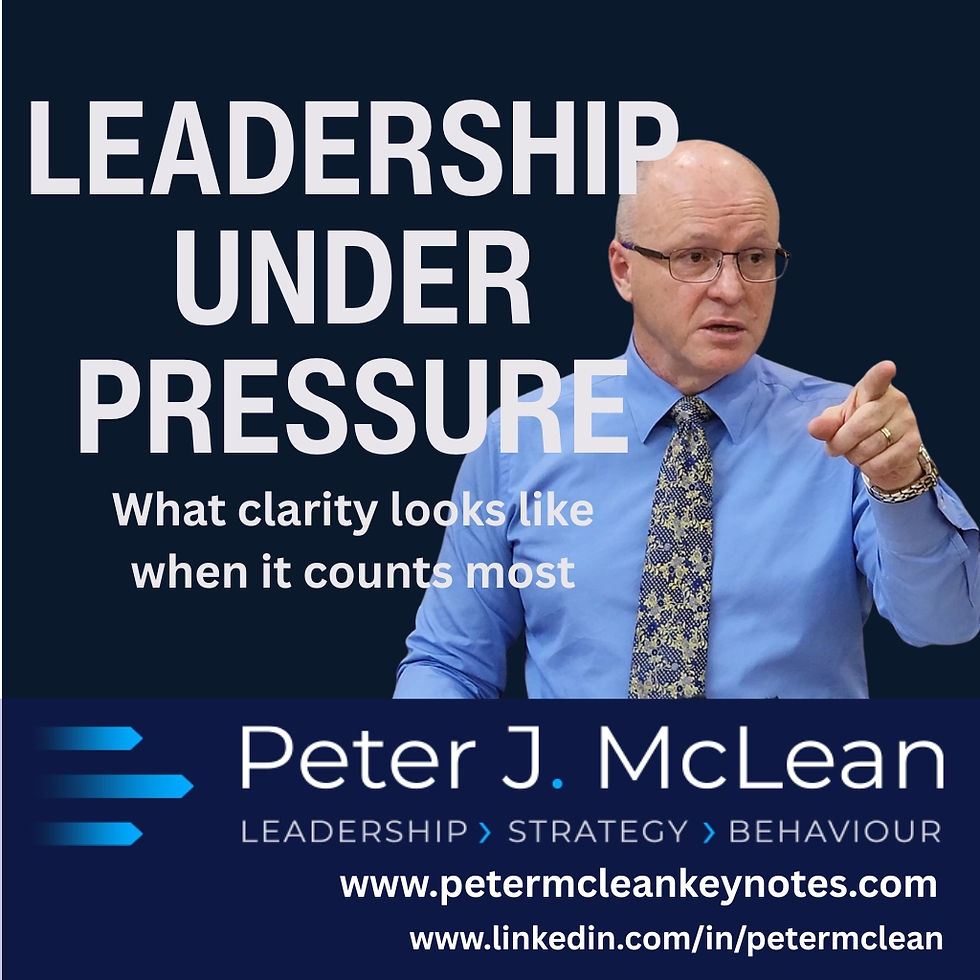Charting The Course Issue #8 - The Imagination of Leaders
- Peter McLean

- Jun 5, 2025
- 4 min read

Issue #8, August 2024
August 1, 2024
The Imagination of Leaders
I've been trying over the last day or so to come up with a word for something I've observed in my research and my experience which is a key difference between okay leaders and great leaders - and that's the ability to see ahead.
In Expert Performance (which is a substantial area interacting within my PhD studies), Ericsson and Charness classically demonstrated with their 1994 paper on "Expert Performance: Its structure and acquisition", expert chess players don't "work out the moves" as they happen. Instead, they see the patterns of possibilities several moves ahead.
Moving the Queen here will result in these possible patterns there. They also visualised that moving a particular chess piece to this particular spot on the board would limit the movement of the opposing player's pieces in such and such a pattern or direction. It's not so much about a million possible moves at that point, so much as patterns of force. The queen can cut off movement across an entire half or even most of the board if positioned correctly at the right time.
This is a quality that experts in various fields demonstrate. An expert engineer may tell you the likelihood of how structural builds will proceed and the variations and how to cope with them in advance or contingently almost immediately. He or she does not have to "work it out". The experts see the patterns.
An expert teacher may instantly see how various techniques will play out in the learning environment and how to manage those to good outcomes. A leader will know the various ways in which some new initiative, change or requirement will play out across the people and the organisation and put measures in accordingly or manage the better results.
It comes down to so much of my work with people, organisations, leadership, management, strategy: I see the possibilities in myriad forms and instant approaches or solutions that work - because I'm expert in people, cognition, communication and its effects, strategy and so on.
It's about seeing 10 steps ahead. But this quality is not ubiquitous by any means. In fact, I am convinced that the vast majority of leaders either do not have or do not practice this faculty. It's evidenced in the incredible amount of floundering one witnesses in organisations, industries, politics, governments and cultural movements.
I have zero desire to get political here, but the upcoming US Presidential election is a case in point: could one person not see that the actions of another would result in the next step - and not have a contingency for it? And they are spending billions on administrators, campaign leaders, consultants, marketers, etc. for this exercise in voting, yet so often seem to be floundering on their way.
Is this an undevelopable, innate quality? Or is it something that can be cultivated in an individual?
I believe the answer is both - for this reason. Human perception is about identifying, tracking and predicting. But the ability of a trained baseball pitcher and catcher to identify, track and predict the velocity, angular momentum, intercept speed and physical management to throw and then catch a ball is some of the most challenging physics out there.
So people can do it naturally, but some high-level training is required to develop it to those standards and some people are going to be more naturally gifted and therefore higher performing than others.
And that's some substantial expertise development right there, folks!
It's the whole precept behind this newsletter: Charting The Course.
An expert captain knows the seas, the vessel's capabilities, the possible routes, the capability of his crew and so on. The captain is an expert and can chart the course and reach the destination.
That's seeing more than 10 steps ahead.
Everyone can do it. Some will be better than others. But it all takes some work, figuring out, help from experts who've been there and done that - or at a minimum been great at helping others - and then working hard at practicing and developing that skill for use in the real world.
Try it in your world.
I'll be searching for or innovating a word (my old University friend, Jonathan Martinez, used to tell me that neologisms were a sign of genius, so I'll be working on that genius moment) to describe this characteristic. I'll let you know once I have it.
From the Front Lines
We're seeing expert performance played out right now at the Olympics. The amount of practice and dedication required from the world's best athletes is frequently all-consuming. While they have tremendous skills, those skills are highly particular to their one event, or possibly a handful of very similar events. You won't, for example, see a gymnast trying to compete as a swimmer.
They know where, strategically, they will play and focus on developing the necessary skills. In a sense, they are thinking 10 steps ahead in terms of their performance. But take them outside of that lane or event and they are lost.
Would so, we could have asked the French organisers to think 10 steps ahead: It seems they have been the biggest blunderers with unforced errors, even in the first few days.
Please feel free to share this newsletter with others.
Inquire with me for consulting, coaching or speaking services that dramatically improve your condition.
Lead With Clarity & Results! Inspirational Leadership Keynote Speaker, Motivational Speaker, Strategy Speaker, Management Consultant, Executive Coach, Executive Leader




Comments